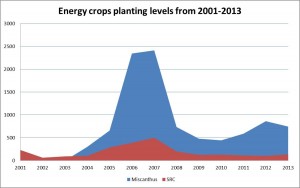Why we need an Energy Crops Scheme 3
The Energy Crops Scheme (ECS) closes to new applications at the end of August 2013. Crops for Energy Ltd has produced a position paper which sets out the need for an improved policy framework for the woody energy crops sector as well as a third round of the ECS. The paper includes a critical appraisal of the first two ECS schemes and provides views on how improvements might be made.
- The first two rounds of the ECS have not widely appealed to English farmers and in both cases there has been a major underspend of the available budget. As a result of the low take up, there appears to be a lack of political will to support a third programme. Nevertheless, virtually every scientific report looking forward to 2050 suggests a pivotal role for woody energy crops in helping us meet our sustainable energy and climate change targets.
Why we need an Energy Crops Scheme 3 Position Paper
Crops for Energy’s Director Kevin Lindegaard says:
“ECS 2 was designed to stimulate the planting of around 40,000 hectares of energy crops and to create a self-reliant industry that could stand on its own two feet without subsidies. The reality is that so far ECS 2 has led to less than 4,000 hectares of planting and measured on this basis it has been a resounding failure. ECS 2 was too bureaucratic and prescriptive. Any follow up needs to be simpler, more flexible and provide greater financial incentives for growers “
“Instead of less funding for woody energy crops we need more. In the last two years in the SW we have seen solar photovoltaic (PV) installations increase from 3,500 to 65,000. This illustrates what can be achieved in a very short time with supportive Government policies. Biomass supply and use is much more complicated than solar PV. But if we are to achieve the required step change for energy crops, policy makers must provide a similar financial tipping point. “
“The emerging detail relating to the Direct Payments Regulations agreed under the Common Agricultural Policy (CAP) reforms provides an opening for the energy crops sector particularly SRC. DEFRA needs to harness this opportunity so that the industry can finally take off.”
The position paper concludes with a wish list of of activities that are required in order to create a more rounded ECS 3. These include the following:
- DEFRA should provide £1-2 million of transition funding for energy crops planting.
- DEFRA should maximise the potential for growing energy crops under new CAP reforms especially as crop diversification options and in Ecological Focus Areas.
- An ECS 3 should provide flat rate establishment grants to simplify the system.
- THE ECS should be more integrated with future Agri-environmental schemes and provide growers with annual payments that recognise the multifunctional benefits of these crops (e.g. biodiversity, flood defence, prevention of water pollution etc.).
- An ECS 3 should cover short rotation forestry (SRF).
- An ECS 3 should grant aid planting material producers (SRC cuttings, miscanthus rhizomes, seeds and plugs) enabling quicker scale up of material.
- A dedicated grant scheme for energy crops infrastructure and processing is required. Grants should be up to 75% of the capital costs.
